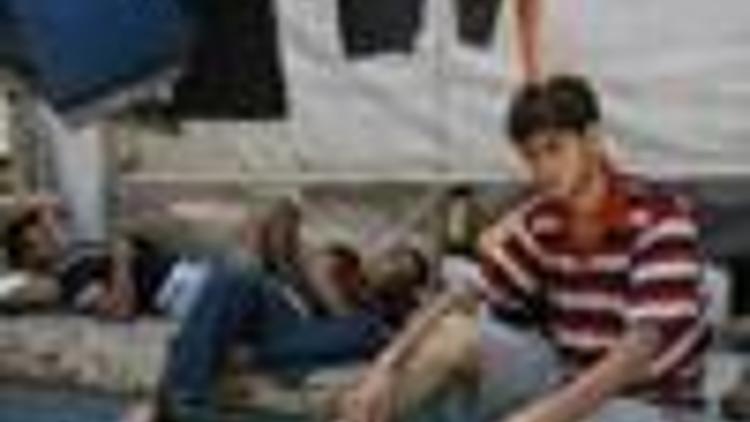A prison for migrants amid EU policy turmoil
Güncelleme Tarihi:

PATRAS, Greece - Migrants, coming from the war-ravaged countries such as Afghanistan to Europe, have high hopes of living free in an area, which is highly considered as a safe haven for human rights.
However, quite contrary to the hopes of these migrants in pursuing a better life, they are unwelcome as in the case of Khalid Mohamed who is trapped in a shantytown in Greece and abused by police, given the new EU Pact, which further deteriorated the situation of the migrants.
The West's war against the Taliban drove Khalid Mohamed from his home. But his search for asylum in Europe has left him trapped in a shantytown in Greece, ignored by the government and abused by police.
Greece's western port of Patras has become a frontier for Europe's unwanted migrants. Hundreds of Afghans live crammed into dirty shacks in a slum overlooked by plush apartment blocks, hoping to stow away aboard a ferry bound for Italy, where asylum conditions are easier.
For Mohamed, who fled Afghanistan last year after losing friends and family in the war, it is a prison camp. He is caught in a limbo without papers or rights, forbidden to stay in Greece but prevented from leaving.
Deepening chaos
It is a situation human rights campaigners say illustrates a deepening chaos at the heart of EU migration policy.
"We never came here to be in prison. We came to be free," said Mohamed. Mohamed has a receipt for his asylum request but has lost hope of being accepted: "Life here's miserable. We've nothing."
Greece is a new frontline for immigration in Europe. As Spain and Italy have cracked down on migrants from the Middle East and Africa, those arrested by Greece rose to 112,000 last year from 40,000 in 2005, many of them from countries at war.
In Patras, Afghan men live in shacks cobbled together from bits of wood and draped in plastic sheets, with a communal shower and no electricity. Skin and respiratory diseases are rife, but going to a hospital risks arrest.
One man has an arm in plaster, another has a bandaged leg in the camp. These are injuries from police beatings, they say. Medical volunteers at the camp say they often treat victims of police abuse.
Not a haven for human rights
"These people come thinking Europe is a haven for human rights but we treat them like animals," said Marcella Tommasi, head of a Doctors Without Borders center at Patras.
Greece's treatment of migrants is among the toughest in the 27-nation bloc, said the United Nations refugee agency UNHCR. Greece accepted just 0.6 per cent of 25,113 asylum applicants in 2007, a disturbingly low rate according to UNHCR.
A new EU pact, approved last month, may worsen the illegal migrants' situation. The brainchild of French President Nicolas Sarkozy, the non-binding deal urges states to tighten external borders, increase repatriations and attract skilled migrants.
A separate EU directive allows illegal migrants to be held for up to 18 months. "It's not humane to hold people for 18 months," said Tommasi. "And it won't stop them coming," Tommasi added.
Illegal route
"EU governments have made it so difficult to hire legal migrants that everyone is being forced down the illegal route," said Martin Baldwin-Edwards, head of the Mediterranean Migration Observatory. "The pact insists Europe doesn't need unskilled immigrants, but every country does, especially in southern Europe," he said.
Dismissing the EU pact as "political blah blah," Baldwin-Edwards points to its failings. It makes no progress in reaching a common definition of asylum, and does nothing to help millions of migrants living in limbo like Khalid, according to Baldwin-Edwards.
Prime Minister Costas Karamanlis has appealed to Greece's European Union partners for more help in coping with the influx of asylum seekers and economic migrants, but the new agreement leaves the onus on individual governments to cope.
EU asylum rules, called the Dublin Regulation, say would-be refugees must return to where they entered the bloc to make their application, usually border states like Greece and Italy.
"This is an undue burden on countries with external borders," said Yiorgos Tsarbopoulos, local head of UNHCR. "This is not European solidarity."
Campaigners say Greece ignores its obligation to provide translators at the border for asylum seekers, and conditions in immigrant detention centers are appalling. MSF denounced a "humanitarian crisis" at one center on Lesbos island, where hundreds were badly sickened in October by polluted drinking water.
"People are walking around like ghosts. They don't exist for the state but they are there," said UNHCR's Tsarbopoulos, adding Greece faced a "crisis situation" as anger at migrants rises.

